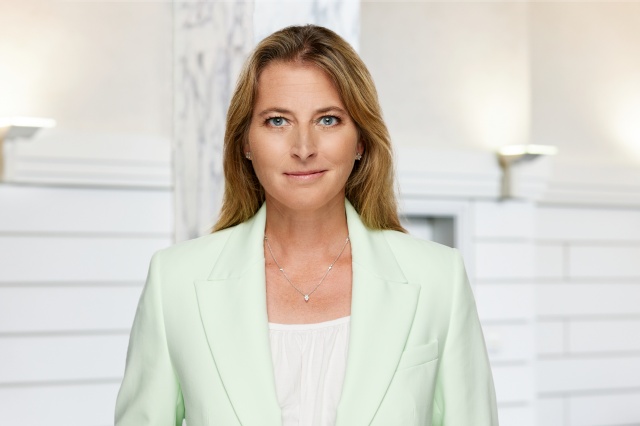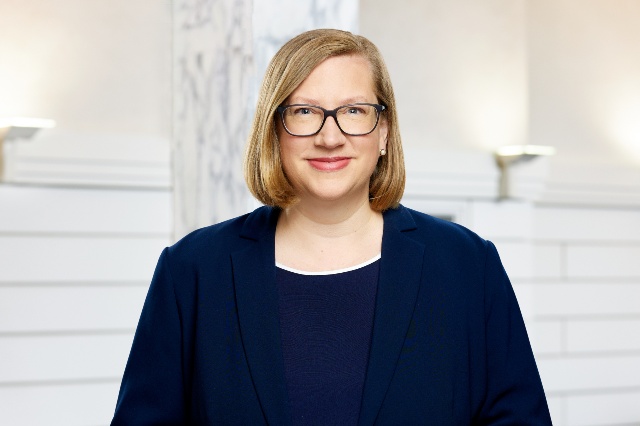Warburg Bank focuses on German locations
- Systematic expansion of outstanding positioning as an independent private bank in Germany under a single brand
- Concentration on serving German and international clients from within Germany following sales in Switzerland and Luxembourg
- Acquisition of NORD/LB Asset Management expands Asset Management
- Unsatisfactory earnings in challenging interest rate and regulatory environment
- Capital ratios improved
- Provision recognized for risks
Hamburg-based private bank M.M.Warburg & CO was formed in 1798 and is now in its 220th fiscal year. With its family background, it is one of the few independent, owner-managed private banks with a deep knowledge of the German middle market. Headquartered in Hamburg, the Bank has a presence in all major economic regions in Germany. It offers its clients, who include high net worth individuals and corporate and institutional clients, a comprehensive range of services in its Investment Banking, Private Banking, and Asset Management divisions. Its small number of shareholders have extensive experience of the banking sector and have been responsible for the Bank’s strategy, which is based on its independence, for many years.
The Bank is managed by three partners: Joachim Olearius (47, Spokesman), Dr. Peter Rentrop-Schmid (49), and Eckhard Fiene (56). After more than 30 years at the Bank, Dr. Henneke Lütgerath (63) stepped down to become a member of the Shareholders' Committee as of the beginning of the year.
Faced with a continuing and challenging mix of low interest rates, intense regulatory activity, public criticism, and shareholder objectives, banks need to critically review and enhance their business models, and adapt them to the new situation. In 2017, Warburg Bank successfully finished integrating its Bankhaus Hallbaum, Bankhaus Carl F. Plump & CO, Bankhaus Löbbecke, and Schwäbische Bank branches. The process, which started in 2016, entailed optimizing a large number of workflows, leveraging synergies, and cutting back office positions.
Despite this, all locations continued to offer the range of services associated with a universal bank. The specialist subsidiaries Marcard, Stein & Co AG (family office bank) and M.M.Warburg Hypothekenbank AG (real estate finance) are maintaining their strong performance as independent institutions.
At the end of 2017, Warburg Bank finished strategically streamlining its foreign activities. M.M.Warburg Bank Schweiz AG’s classic private client business was transferred to St. Galler Kantonalbank AG. The Warburg Group’s family office unit in Switzerland, PCP Private Client Partners AG, assumed responsibility for the larger family fortunes.
At the same time, the Bank carried on strategically realigning its asset management activities. As of the year-end, Warburg Bank sold its two Luxembourg subsidiaries, M.M.Warburg & CO Luxembourg S.A. and WARBURG INVEST LUXEMBOURG S.A., to Apex Group Ltd. A strategic partnership was agreed with Apex for the asset management services based in Luxembourg. Following the sales, future growth will focus on the German market. Within the Asset Management division, there is a shift taking place away from administrative activities and towards portfolio management. This move significantly streamlines the increasingly complex supervisory requirements associated with cross-border activities.
As part of the Bank’s growth and focus strategy for Germany, it signed an agreement to purchase a majority interest in NORD/LB Asset Management; going forward, this will form part of the Asset Management division alongside WARBURG INVEST Kapitalanlagegesellschaft mbH. The acquisition largely offsets the volumes shed as a result of the sale of the Bank’s activities in Luxembourg. The new company will strengthen the Bank’s asset management and servicing solutions offering, and extend the use of forward-looking strategies such as liquid alternatives, sustainable investments, and quantitative approaches going forward. Another focus will be on expanding German and European small and mid-cap stocks, which are extremely well positioned on the market thanks to the Warburg Small & Mid-Caps fund.
Joachim Olearius: “Strategically streamlining our infrastructure has provided us with a coherent response to the excessive regulatory requirements for non-systemically relevant banks. We are positioning ourselves as an alternative to banks that are either too large or too small. And, thanks to our concentration on the quality of our core business segments, we are experiencing encouraging demand.”
In the fall of 2017, the Warburg Navigator became one of the first German robo-advisors to hit the market. The tool was developed together with Elinvar, the Berlin-based fintech company, and combines standard non-predictive mathematical models with the fundamental expertise offered by Bank’s asset managers. The result is an individual investment strategy for client assets of EUR 20,000 or more. Work is now progressing on optimizing the model to produce highly customized portfolios. The Navigator and the OWNLY family office app form part of Warburg Bank’s digital strategy.
The shipping unit, for which additional staff were recruited, also performed well and was expanded to include new offerings. In addition to providing conservative financing, the focus is increasingly shifting towards offering support for the operational shipping business and hence acting as a service provider for the sector. As a result, the Bank was able to acquire new clients both in Germany and abroad.
In April 2018, Warburg Bank introduced a new logo and the Warburg brand name has now been added at the start of all unit names, and especially the branch offices. This clear and transparent positioning presents the Warburg Group as a single entity throughout Germany.
Joachim Olearius: “The Warburg brand’s reputation for business-owner focused banking services extends far beyond Germany. We shall continue to offer this service internationally from within the country.”
In the past 12 months, the Bank had to fulfill a large number of new European and German regulations and to implement them in its business operations. It successfully complied with all requirements, and in particular those relating to MiFID II, PSD II, EMIR, the European Union’s 4th Anti-money Laundering Directive, the new Wire Transfer Regulation, the introduction of legal entity identifiers (LEIs), and the revised Investmentsteuergesetz (InvStG – German Investment Tax Act) on time and in full, without resorting to the large-scale use of external consultants. Nevertheless, the excessive regulatory requirements are a significant cost driver.
Business Performance
Consolidated total assets for M.M.Warburg & CO Gruppe GmbH as of the December 31, 2017, reporting date amounted to EUR 7.4 billion (previous year: EUR 8.4 billion). The decline was due to the deconsolidation of M.M.Warburg Bank (Schweiz) AG and of the Luxembourg companies previously belonging to the Group. It was partly offset by the acquisition of fund assets under a fiduciary relationship. This was also largely responsible for the slight increase in Warburg Bank’s total assets, which rose from EUR 5.1 billion to EUR 5.4 billion.
The Bank’s core capital ratio rose to 12.7%, a clear improvement on the prior-period figure (11.2%). The Group’s total capital ratio increased significantly from 11.6% in the previous period to 13.1%. The core capital ratio for the Group improved from 8.9% to 10.3%, while Group equity amounted to EUR 365.1 million (previous year: EUR 372.7 million). Own funds, which also include Tier 2 capital, totaled EUR 469.3 million as of the reporting date (previous year: EUR 423.7 million). As a result, the M.M.Warburg & CO Group comfortably meets all supervisory capital requirements.
Joachim Olearius: “Our owner families continue to see our independence as a big advantage for our clients, as this allows us to actively pursue our common interests.”
Net fee and commission income rose encouragingly again in the reporting period, climbing almost 9% to EUR 175.1 million after EUR 161.0 million in the previous year. The ongoing low interest rate environment continued to impact the Group’s net interest income. The figure declined year-on-year from EUR 56.4 million to EUR 49.2 million. The ratio of net fee and commission income to net interest income was 78% to 22%. Fee and commission income is derived from several sources, reflecting the Bank’s broad business base. The Equities and Equity Capital Markets units turned in a strong performance hand in hand with Warburg Research, while Asset Management also grew substantially. The sale of the Luxembourg business led to a fall in the total volume of assets under management from EUR 54.1 billion to EUR 39.3 billion.
Net trading income increased from EUR 8.8 million in the previous year to EUR 10.5 million. The cost trend was unsatisfactory, due among other things to the organizational changes within the Group. The Group’s cost/income ratio was 97.9% (previous year: 94.4%).
At the level of Warburg Bank, net income for the reporting period improved substantially year-on-year to EUR 27.0 million (EUR 7.0 million) as a result of the disposal gain associated with the sale of the Luxembourg companies.
Consolidated net income for the year amounted to EUR 10.0 million compared with EUR 22.2 million in the previous year. One-time factors associated with the sale of the Luxembourg units and a provision for operational risks were key items affecting earnings. Net loan loss provisions declined year-on-year. The remaining provisions primarily related to the shipping loans business.
Operational Risk
In the course of the past fiscal year and at the start of the new calendar year, individual media outlets published conjectures and speculations that the Bank was involved in performing share transactions around the relevant dividend record dates. This largely goes back to proprietary share trading by the Bank around the time that the dividend payments were made; these trades were settled via a domestic custodian bank in the period between 2007 and 2011. Settlement within Germany prevents the investment income tax being refunded twice at the level of Warburg Bank. Nevertheless, the public prosecutor in Cologne has been investigating senior managers and employees of M.M.Warburg & CO in this context since 2016 on the grounds of an initial suspicion of tax evasion. M.M.Warburg & CO has cooperated in full with the public prosecutor and the tax investigators ever since the allegations became known. Nevertheless, in 2017 the competent tax authority, acting on the instructions of the Federal Finance Ministry, revoked the tax offset notice for M.M.Warburg & CO Gruppe GmbH for 2010. An appeal has been lodged against the decree and the application that was made to stay the execution of the decree was granted. Senior management is convinced that its tax treatment of the transactions complies with all legal requirements. Since the audits being performed in this connection have not yet been completed, the possibility of related claims being brought against M.M.Warburg & CO Gruppe GmbH cannot be fully ruled out as yet. For this reason, M.M.Warburg & CO Gruppe GmbH recognized a provision for operational risks that covers in full the tax and interest receivables for 2010 and 2011 that are not time-barred.
Outlook
Germany’s economy has remained remarkably stable to date in a changing global environment that is dominated by negative interest rates, a shifting political landscape, and technical accessibility. Equally, there are currently few signs that this trend will reverse in the near future. Forecasts suggest that the global economy will continue to gain momentum this year, and that 2018 will be another successive year of growth. Despite the positive fundamental data, however, stock exchanges came under pressure for a time in the first quarter.
The earnings pressure on banks will continue unchanged as long as the ECB maintains its low interest rate policy and regulatory activity remains intense. Implementing MiFID II represents a challenge in the Bank’s advisory business for both private and institutional clients – and, as desired by lawmakers, is resulting in a paternalistic approach to them. In addition, young start-ups – fintechs – are crowding onto the market and developing a wide range of digital financial services. These are undoubtedly triggering a burst of innovation in the sector. However, it is still difficult at present for banks and clients to tell what services offer long-term added value – a topic where security and trust remain extremely important. Warburg Bank’s sound financial standing, long track record, and stable shareholder background will remain in demand in this modern environment as well.
One of the key challenges facing the Asset Management division will be to identify companies that will be among the winners of the ongoing process of technological transformation. For clients, this means that new markets and new sectors will both emerge and disappear more and more quickly. An active approach to these changes is needed. Warburg Bank’s goal is to be a reliable and innovative partner at all times, and it can continue to build on a stable foundation in its 220th year of business.
New technology is also becoming more and more important for traditional banks. Although ongoing regulatory and earnings pressure has put the main focus on safeguarding and optimizing existing operations, Warburg Bank is aware that it is essential to push forward with implementing its systematic digital transformation process if it is to remain competitive and fit for the future. The high up-front costs will be offset by savings and improved profitability.
The Bank’s number one priority is to ensure the satisfaction of all its clients with the goal of continuing to find the best solutions together in a spirit of trust and cooperation, in the future as in the past.


